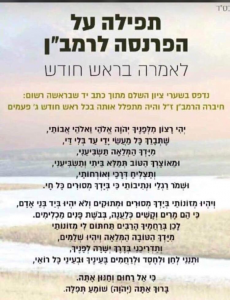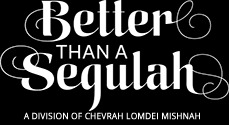Bamidbar 2021: Superstition vs a Segula
by devadmin | May 12, 2021 9:44 pm
Superstition vs a Segula
According to Dictionary.com -and who knows better- superstition can be defined as excessively credulous belief in, and reverence for supernatural beings. A superstation is a widely held but unjustified belief in supernatural causation leading to certain consequences of an action or event, or a practice based on such a belief.
Next: The Ois hereby proclaims that this month (the Hebrew month of Sivan), he will become quite wealthy and each of his kids will bring him much joy and nachas. And he knows this how? Because he added two bazundere (separate and distinct) segulas to his regular routine of prayers. What the hec is a segula you ask? We shall address that below, but first this thought and admission.
In a few more days, the counting of “sefira” comes to an end as we usher in the Yom Tov of Shovuis when we celebrate our marriage to the RBSO. He married us, we married Him, He gave us the Ten Commandments as a wedding gift; we’ve been giving Him trouble ever since. Why? It’s our nature to be mischievous, even bad. Frankly, that’s how He programmed us.
This past weekend, as the heylige shabbis was coming to an end, the Ois found himself leading the maariv davening. Just before the Olaynu prayer which complete all our tifilos (prayers) it was time to count the sefira. Ober what to do when the person leading is no longer eligible to make the sefira brocho? As we count up these last few days of the Omer, the heylige Ois admits that yet another cycle of counting is about to be completed and once again he has failed to make it to the finish line. Mamish a Shanda but so very emes. Ober, what to do? Make the brocho illegally? Or, turn around and announce publicly and sheepishly that I was out, disqualified to recite the blessing, and ask for a volunteer to jump in and count sefira with the brocho? What would you do? And before you answer truthfully, let’s introduce one more factoid. It so happens that we were a minyan of just 11 or perhaps 12 Yiddin, a few but socially orthodox only. The Ois sucked it up, turned around and proclaimed that he was ineligible to make the brocho for the sefira and asked for a volunteer. What happened next? Each of the participants admitted that they too were out of the running; not a one was available to make the sefira brocho. The Ois is left to wonder how he might have acted were he among a larger crowd with more orthodox people at the minyan? What would you have done? Admit and accept the moment and embarrassment? Or, act stoic and make the illegal brocho? What’s pshat an illegal brocho anyway? Will one really receive lashes or another form of severe punishment for making a brocho when halocho seems to mandate that one cannot? Give me a break please! The bottom line: when you meet your Maker and if during the punishment due you hear that the next lash is for making an illegal brocho, be comforted in knowing you are at the very end of your punishment and heaven awaits you. Veyter.
Welcome to Sefer and Parshas Bamidbar which is wholly dedicated to another census the RBSO ordered. Seemingly the RBSO likes counting us -so Rashi tells us- ober this year, in our 11th time around the parsha (who’s counting), we shall take a detour and discuss instead a topic that’s been on my mind of late. For a review on the parsha itself, feel free to check out the archives www.oisvorfer.com for prior postings dating back over a decade; they are givaldig mamish.
 What’s on the heylige Ois’s mind this week is the segula. The what? What is the segula? Let’s find out. Just yesterday, a WhatsApp chaver -let’s call him Yossie Singer- sent over a segula to be recited on Tuesday Erev Rosh Chodesh Sivan (yesterday). This particular segula (this one, a specific prayer) was authored by the Sheloh Hakodosh and is designed for parents to have good children. Find the English version below, and here is the link to the prayer on Artscroll’s Website. The Sheloh writes “the most appropriate time to recite this prayer is on Erev Rosh Chodesh Sivan, for that is the month when Hashem gave us His Torah, and when we began to be called his children”.
What’s on the heylige Ois’s mind this week is the segula. The what? What is the segula? Let’s find out. Just yesterday, a WhatsApp chaver -let’s call him Yossie Singer- sent over a segula to be recited on Tuesday Erev Rosh Chodesh Sivan (yesterday). This particular segula (this one, a specific prayer) was authored by the Sheloh Hakodosh and is designed for parents to have good children. Find the English version below, and here is the link to the prayer on Artscroll’s Website. The Sheloh writes “the most appropriate time to recite this prayer is on Erev Rosh Chodesh Sivan, for that is the month when Hashem gave us His Torah, and when we began to be called his children”.
You have been the Eternal, our G-d, before You created the world, and You are the Eternal, our G-d, since you created the world, and You are G-d forever. You created Your world so that Your Divinity should become revealed through Your holy Torah, as our Sages expounded on the first word therein, and for Israel, for they are Your people and Your inheritance whom You have chosen from among all nations. You have given them Your holy Torah and drawn them toward Your great Name. These two commandments are, “Be fruitful and Multiply” and “You shall teach them to your children.” Their purpose is that You did not create the world to be empty, but to be inhabited, and that it is for Your glory that You created, fashioned, and perfected it, so that we, our offspring, and all the descendants of your people Israel will know Your Name and study Your Torah.
Thus I entreat You, O Eternal, supreme King of kings. My eyes are fixed on You until You favor me, and hear my prayer, and provide me with sons and daughters who will also be fruitful and multiply, they and their descendants unto all generations, in order that they and we might all engage in the study of Your holy Torah, to learn and to teach, to observe and to do, and to fulfill with love all the words of Your Torah’s teaching. Enlighten our eyes in Your Torah and attach our heart to Your commandments to love and revere Your Name.
Our Father, compassionate Father, grant us all a long and blessed life. Who is like You, compassionate Father, Who in compassion remembers His creatures for life! Remember us for eternal life, as our Forefather Avraham prayed, “If only Yishmael would live before You,” which the Sages interpreted as “…live in reverence of You.”
For this I have come to appeal and plead before You, that my offspring and their descendants be proper, and that You find no imperfection or disrepute in me or them forever. May they be people of peace, truth, goodness and integrity in the eyes of G-d and man. Help them to become practiced in Torah, accomplished in Scriptures, Mishnah, Talmud, Kabbalah, mitzvos, kindness, and good attributes, and to serve you with an inner love and reverence, not merely outwardly. Provide every one of them with their needs with honor, and give them health, honor and strength, good bearing and appearance, grace and loving-kindness. May love and brotherhood reign among them. Provide them with suitable marriage partners of scholarly and righteous parentage who will also be blessed with all that I have asked for my own descendants, since they will share the same fate.
You, the Eternal, know everything that is concealed, and to You all my heart’s secrets are revealed. For all my intention concerning the above is for the sake of Your great and holy Name and Torah. Therefore, answer me, O Eternal, answer me in the merit of our holy Forefathers Avraham, Yitzchak, and Ya’akov. For the sake of the fathers save the children, so the branches will be like the roots. For the sake of Your servant, David, who is the fourth part of Your Chariot, who sings with Divine inspiration.
A song of ascents. Fortunate is everyone who fears the Eternal, who walks in His ways. When you eat of the toil of your hands, you are fortunate, and good will be yours. Your wife is like a fruitful vine in the inner chambers of your home; your children are like olive shoots around your table. Look! So is blessed the man who fears the Eternal. May the Eternal bless you from Zion, and may you see the good of Jerusalem all the days of your life. May you see your children’s children, peace upon Israel.
Please, O Eternal, Who listens to prayer: May the following verse be fulfilled in me: “‘As for Me,’ says the Eternal, “this My covenant shall remain their very being; My spirit, which rests upon you, and My words which I have put in your mouth, shall not depart from your mouth nor from the mouths of your children, nor from the mouths of your children’s children,” said the Eternal, “from now to all Eternity.” May the words of my mouth and the thoughts of my heart be pleasing before You, Eternal, my Rock and my Redeemer.
And if that weren’t enough good news in one week, and surely having good kids should be, there is more. This morning on Rosh Chodesh Sivan mamish, at 9:43AM, I figured out how to heal my ailing stock portfolio. The same WhatsApp chaver – let’s still call him Yossie Singer- sent over a seemingly recently discovered prayer written by no lesser a Torah giant than the RambaN, this one designed to make me whole and then some. I’m going to be wealthy! Shoin.

Ober, are we to believe that by reciting this payer that all will be good with our kids? With our portfolios and our jobs? Does this segula work? Do any? Did the RambaN actually author this segula prayer? So happens that the word segula appears in the heylige Toirah (Shmois 19:5 and in Devorim (7:6) where the RBSO refers to the Jewish nation as His segula (treasure). We are His treasure, His “Chosen People” whatever that means. Says Rashi (Shmois 19:5), that a segula is “a favored [or beloved] treasury as in ‘and the treasure of kings and provinces’ (Koheles 2:8) [i.e.] expensive vessels and precious stones that kings store away.” Not clear yet?
Says Rabbenu Bachya ibn Pakuda, “That which is hidden, covered, and concealed from the eye is called ‘segula’.” And says the Ohr Hachaim, that a segula is “a charm that supersedes logic.” In plain English: the segula seems to be a good luck charm of sorts. At times, it’s a prayer, at others, it might be an action or something physical. A segula then is a talisman or amulet traditionally used to bring good luck or health and prosperity. In other words, a segula is a powerful remedy that has nothing to do with logic. The segula is seemingly rooted in history and spirituality. The segula (somehow) effects protection and salvation for those that follow it with the right intentions. The segula might be thought of as a folk remedy, safeguard, superstitious action, and talisman that is a divinely bestowed reward as a result of an individual’s participation in a minhag (custom) or mitzvah. The segula -so say the kabbalists- is a procedure that is not based on medical or scientific logic yet is efficacious in improving a situation or protecting a person from harm. How that all works, ver veyst?
By way of example only, according to Jewish tradition, there are remedies that can be used by people when they are ill. A number of medicines are exclusively dedicated to curing portions of our physical bodies, while others are dedicated to spiritual maladies. Segulas, are seemingly spiritual remedies. The segula is a spiritual medicine, that acts as a mystic tool of spirit, whatever that means.
One thing is certain: Yiddin -Ashkenazic and Sephardic- in every community around the world, are busy with segulas. And the question is azoy: are these things real? Do they work? Is it kosher to rely on a segula? Is there a segula for good health? For wealth? For raising good children? For meeting one’s bashert? For fighting the yetzer horoh? For ridding oneself of sexual fantasies involving the forbidden? For fighting the ayin hora? Are segulas acceptable as prayers? More so? Are they an alternative to prayers? Is there a difference between different types of segulas? Must we know the origin of any segula we try and how it supposedly works?
 Where can you find the right segula? Is there a reference book of segulas? Where can one find a segula tailor-made to one’s particular spiritual or even physical malady? Nu, believe it or not, while researching this topic, the heylige Ois came across many interesting segulas, some serious, others more comical and still others that may border on idol worship and the bizarre. Let’s begin with a few of the more conservative and logical ones mentioned in the heylige Gemora and elsewhere.
Where can you find the right segula? Is there a reference book of segulas? Where can one find a segula tailor-made to one’s particular spiritual or even physical malady? Nu, believe it or not, while researching this topic, the heylige Ois came across many interesting segulas, some serious, others more comical and still others that may border on idol worship and the bizarre. Let’s begin with a few of the more conservative and logical ones mentioned in the heylige Gemora and elsewhere.
- Need a segula to recover from illness? Go to a doctor! (heylige Gemora Berachos 60a, Baba Kamma 46b)
- Segula for longevity? Lead a healthy lifestyle (Rambam, Dey’os 4:20)
- Segula for marriage? Look for a suitable wife (heylige Gemora Kiddushin 2b)
- Segula for shalom bayis? Practice love and forbearance (Sanhedrin 7a, Baba Metzia 59a)
- Segula for children – daven to the RBSO! (Shmuel I 1)
- Segula for Yiras Shomayim? Learning (Avos 2:5), wear a kippah (Shabbos 156b)
- Segula for spirituality? Learning and mitzvah observance (Megillah 6b)
- Segula for Kavono while davening – take it seriously (Berachos 5:1)
- Segula for pure faith – don’t believe in Segulas (Devarim 18:13)
- Segula for honest Parnoso (livelihood) – learn a profession (Kiddushin 30a)
- Segula to prevent drowning – learn how to swim (ibid.)
- Segula for wealth – tithe your money (Devarim 14:22, Shabbos 119a, Taanis 9a )
- Segula for bumper crops – observe Shmita (Vayikra 25)
- Segula for old age – honor your parents (Shmois 20:12), fulfill Shiluach haKan (Devarim 22:7)
- Segula for children who are Talmidei Chachamim – light Shabbos candles (Shabbos 23b)
- Segula for a nice home – be meticulous with Mezuzah (ibid.)
- Segula for growth in Torah learning – fear of Rabbinic leaders (ibid.)
- Segula for same – gladden Chasan and Kalla (Berochos 6b).
- Segula for unlimited Nachalah – make a brocho on a full cup of wine (Berochis 51a)
- Segula for wise and wealthy children – give Tzedakah (Bava Basra 9b)
- Segula for sitting in the Yeshiva Shel Maalah – help a Torah scholar with his business affairs (Pesachim 53b) or teach Toirah to your friend’s son (Baba Metzia 85a)
- Segula for absolutely anything at all – daven (Source: Yeshaya 65:24, per Nefesh HaChaim)
As you read above, our sages were quite wise and gave practical advice. Ober, what if you’re a person who is plagued with terrible thoughts daily? What if you have tantalizing sexual fantasies involving someone forbidden to you? What to do if a fire is raging in your pants, if you chap? What to do? Is there a segula to snuff out the fire? Nu, believe it or not, our sages and others knew that many suffer from such thoughts and says the Shaloh Hakodosh (Shaar haOsiyos 30) in the name of Rav Moshe Cordevero who seemingly had segula prescriptions for many a spiritual malady, azoy: he once heard from an elderly Jew that an effective method (segula) for removing forbidden thoughts from one’s mind is to repeat the following posik [verse] over and over: “The fire on the altar shall be kept burning on it, it shall not be extinguished.” This posik is from the heylige Toirah [Vayikra 6:6]. The bottom line: one fire puts out the other.
 The Shaloh comments that he is sure that the “elderly Jew” who Rav Moshe Cordevero heard this from was none other than the prophet, Eliyahu [Elijah]. However, due to Rav Cordevero’s great modesty, he did not want to reveal the true source, since that would have revealed that he was worthy of conversing with Eliyahu. Ober, you might be klerring and correctly so, azoy: what does this pasuk have to do with forbidden thoughts?
The Shaloh comments that he is sure that the “elderly Jew” who Rav Moshe Cordevero heard this from was none other than the prophet, Eliyahu [Elijah]. However, due to Rav Cordevero’s great modesty, he did not want to reveal the true source, since that would have revealed that he was worthy of conversing with Eliyahu. Ober, you might be klerring and correctly so, azoy: what does this pasuk have to do with forbidden thoughts?
A much-abridged answer from a much longer discussion on this very topic goes something like this: Rabaynu Bechaya explains the difference between a Sin Offering and an Olah offering. The sin offering (korban chatas) comes from [unintentional} violations of prohibited actions. The korban olah, on the other hand, atones for improper thoughts. Says Rabaynu Bechaya that improper thoughts, are something that a person can never totally escape. Unfortunately, they are very prevalent and more so at night than during the daytime. His words mamish! It is for this reason that the Olah offerings are to burn the entire night. Nighttime is when people need atonement from improper thoughts. About this it is written [Vayikra 6:2], “Command Aharoin and his sons, saying: This is the law of the burnt-offering: It is the burnt-offering that stays on the flame, on the altar, all night until the morning, and the fire of the Altar should be kept aflame on it.”
And? Now we know what Eliyahu meant when he told Rav Moshe Cordevero that the segula for ridding oneself of evil thoughts is recitation of the posik at the end of the chapter on burnt offerings: “The fire on the altar shall be kept burning on it, it shall not be extinguished.” [Vayikra 6:6]. And? In our times, when the temple has been flattened but you are erect, if you chap, we seemingly get credit for sinful and lustful thoughts by reciting the pisukim associated with the sacrifices. The bottom line: if one recites the relevant -above mentioned- pisukim from the section of the Korban Oilah (burnt offering), it is, as if he brought a burnt offering and he thereby receives the segula associated with the Korban – namely protection from evil thoughts. Gishmak!
As an aside, the heylige Gemora (Berochis) tells us that one eitza (idea) for protecting ourselves from the yetzer hora (I believe the Gemora is referring specifically to improper thoughts and being motzei zera (having a release, if you chap) in one’s sleep), is to repeat a posik found in the Keriyas Shema Al HaMitta. The words are “Rigzu v’al techata’u” (Tremble and do not sin…). And that my friends is how one is protected at night while asleep and dreaming. Ober what to do about the daydreamers? The good news: the segula mentioned above is for any time of day when one is confronted by improper thoughts. Mamish gishmak. The bottom line: the Ois has yet to find a segula to bring on improper thoughts and fantasies about the forbidden; seemingly, these are natural occurrences and don’t require supernatural intervention. Shoin! And here for your enjoyment, are a few of the lesser known segulas, each mentioned somewhere by someone with some authority.
Did you know that buying a burial plot is a segula for a long life? So says the medrish, and those in the business of selling plots and headstones. They advise us to purchase a burial plot while we are still alive and well. They say it’s a segula for a long life. And did you know that placing a pigeon on a person’s navel is efficacious for curing jaundice? Mistama not! one thing is zicher: it’s a segula to take shower! Have you misplaced your keys? Your wallet? Your air-pods? Want to find them? There is a segula for that as well. Giving tzedoko in the zechus (merit) of Rabbi Meir Baal Hanes is a segula for finding a lost object. Says who? So says the Ois’s daughter Alex and others who have tried this with some success. And more good news: Buying a new knife for Rosh Hashono is a propitious remedy for livelihood. Also, one can hang a special note around the neck of a chicken and use it to identify a thief.
Ober, can a segula also be helpful in protecting us from harm? Does the “roite ebdel” (red string) work? What is the red string? Wearing a red string cut from a longer length that has been wound around Kever Rochel (Rachel’s Tomb) is an ancient tradition that (supposedly) protects the wearer from danger. Does that work? Supposedly, one who wears a red string that was wound around Rachel’s tomb is protected from the evil eye (ayin horo) as well as other negative influences. Some men carry red strings in their wallets, and women who are pregnant or trying to get pregnant sometimes wear red strings around their waists. Does that work? The bottom line: aside from the dubious peddlers of these red strings (wholesalers, retailers and stam azoy street vendors) who promise all types of mystical powers for anyone willing to pay exorbitant prices for their red stings guaranteed to have come from Kever Rochel, the only classic source which does mention the red thread expressly forbids its use, saying that tying a red thread on one’s fingers is an idolatrous practice. Yikes! Some have likened these red strings to superstitious practices resembling idol worship as described in Tosefta Shabbos 7:1, where certain practices, including tying a red string around one’s finger, are prohibited because of “darchei emori.” On the other hand, said Rabbi Moshe Stern, the Debretziner Ruv (author of Beer Moshe), azoy regarding the tying of strings on children to ward of the evil eye. He wrote: “That was the common practice; they were careful to tie a red string on the carriage or the crib of a child because of the evil eye. All of these are the practices of elderly women, regarding which the Rashba wrote that we should not mock their words and practices, for they are certainly founded in the sacred origins, even if we have forgotten the reasons.” Which view is correct, ver veyst? And says the Sefer V’zeh Shaar Hashamayim (Rabbi Dovid Rozoff), azoy: “it is an old custom to tie the red string around the neck or wrist, as a protection against many dangers, especially for pregnant women. First one should wind the string around the monument at Kever Rochel, thus transforming it to a segula, proven effective time after time.”
The list of segulas, those in favor and those not, is endless. What is the bottom line of these man-made segulas for wealth, good children, being healed of sickness, lustful thoughts, and so many other spiritual and physical maladies? We don’t know if they work or not. Says the heylige Ois azoy: anything you try is a superstition if it doesn’t work out in your favor. If it works, it becomes a segula!
 The bottom line: there are myriad segulas regarding an increase in one’s parnoso. Some have the minhag of reciting Parshas Hamon, one a year. Other, recite it daily. They say it’s very effective. Ober said the Satmar Rebbe azoy: the segula of Parshas HaMon is only valid until 9am. After that you have to GO TO WORK! Given the amount of charity campaigns we are bombarded with daily –albeit a good number of them nothing but scams- it appears that many are still in need. Do we send them a check or forward them any or all of the segula prayers?
The bottom line: there are myriad segulas regarding an increase in one’s parnoso. Some have the minhag of reciting Parshas Hamon, one a year. Other, recite it daily. They say it’s very effective. Ober said the Satmar Rebbe azoy: the segula of Parshas HaMon is only valid until 9am. After that you have to GO TO WORK! Given the amount of charity campaigns we are bombarded with daily –albeit a good number of them nothing but scams- it appears that many are still in need. Do we send them a check or forward them any or all of the segula prayers?
More bottom lines: Many segulas do have a mekor (oral or written foundation) rooted somewhere, and from someone of note. On the other hand, superstitions come from the secular world. To the secular world, our segulas are superstitions and vice versa. Do they work? Ver veyst? If they make one feel better, why not try but don’t quit your day job.
A gittin Choidesh and a gittin Shabbis!
The Heylige Oisvorfer Ruv
Yitz Grossman
Source URL: https://oisvorfer.com/bamidbar-2021-superstition-vs-a-segula/